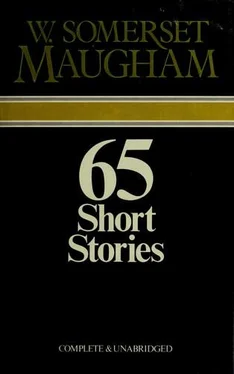Somerset Maugham - Sixty-Five Short Stories
Здесь есть возможность читать онлайн «Somerset Maugham - Sixty-Five Short Stories» весь текст электронной книги совершенно бесплатно (целиком полную версию без сокращений). В некоторых случаях можно слушать аудио, скачать через торрент в формате fb2 и присутствует краткое содержание. Жанр: Фантастика и фэнтези, на русском языке. Описание произведения, (предисловие) а так же отзывы посетителей доступны на портале библиотеки ЛибКат.
- Название:Sixty-Five Short Stories
- Автор:
- Жанр:
- Год:неизвестен
- ISBN:нет данных
- Рейтинг книги:4.5 / 5. Голосов: 2
-
Избранное:Добавить в избранное
- Отзывы:
-
Ваша оценка:
- 100
- 1
- 2
- 3
- 4
- 5
Sixty-Five Short Stories: краткое содержание, описание и аннотация
Предлагаем к чтению аннотацию, описание, краткое содержание или предисловие (зависит от того, что написал сам автор книги «Sixty-Five Short Stories»). Если вы не нашли необходимую информацию о книге — напишите в комментариях, мы постараемся отыскать её.
Sixty-Five Short Stories — читать онлайн бесплатно полную книгу (весь текст) целиком
Ниже представлен текст книги, разбитый по страницам. Система сохранения места последней прочитанной страницы, позволяет с удобством читать онлайн бесплатно книгу «Sixty-Five Short Stories», без необходимости каждый раз заново искать на чём Вы остановились. Поставьте закладку, и сможете в любой момент перейти на страницу, на которой закончили чтение.
Интервал:
Закладка:
65 Short Stories
INTRODUCTION
William Somerset Maugham was born in 1874 and educated at the King's School, Canterbury and Heidelberg University. He spent some time at St Thomas's Hospital as a medical student but was attracted from medicine to letters by the success of his first novel, Liza of Lambeth (1897), in which he drew on what he had seen in the district served by his hospital. He also drew on his medical experience in his first masterpiece, Of Human Bondage (1915). Upon the appearance of The Moon and Sixpence(1919) his reputation as a novelist was established. He was at the same time a successful playwright, his last play, Sheppey, appearing in 1933. Apart from short stones, his work included essays, criticism, autobiography and travel books.
A widely travelled man, he spent much of the 1914-18 war abroad in the intelligence service-the time in which he laid the basis of the Ashenden' stories. In the 'twenties he took up residence in the south of France and, but for the last war, lived there until his death in December 1965.
The stories published here were largely written in the three decades following the First World War. Although Maugham had written short stories early in his career, preoccupation with his other writing led to a long interval before he next took up the form, on a voyage in the South Seas in 1919, originally as a relief from other work. It is consequently an irony which he would have appreciated that many consider him to be at his best in his short stories. When he stopped writing them he made a collection of those that he wished to preserve and arranged them in the order felt to be most agreeable to the reader. This edition as far as possible preserves that arrangement.
A good part of the success of his stories derives from the technique that Maugham used. He discussed this in the preface to the first American edition
of his collected short stories and compared it with the contrasting techniques of Chekhov and de Maupassant. Chekhov had markedly superior characterisation, he said, but de Maupassant did give his short stories a beginning, a middle and an end-which Maugham approved, and which is the key to his style: 'My prepossessions in the arts are on the side of law and order. I like a story that fits.' Such was his answer to critics who had applied the word 'competent' to his stories, disparagingly as they thought-and, judging by the stories' vast and continuing popularity, unwisely.
Following this principle, Maugham developed a style which was as ordered as his general plan. His sentences are short. They balance one another and are balanced in themselves. They are a highly appropriate form for his narratives, stamped as they are by their fluency and discursiveness. Moreover, it is a style equally suited to Maugham's view of his characters: a view that is largely detached, cool, at times slightly cynical but tempered constantly by a wry sense of humour-as illustrated by 'Jane'. Maugham is, however, at ease equally in pure comedy ('The Facts of Life') and in high tragedy ('The Unconquered'). His stories are with the same felicity as varied in mood as they are in setting.
Each of these stories can stand on its own. Maugham himself wrote that such a compactness of technique, character and incident may seem disconcerting in a world where at least one loose end is normally left behind; but the compactness is part of the method used by such short story writers as Maugham. As he put it in his own distinctive way, such a writer 'seeks to prove nothing. He paints a picture and sets it before you. You can take it or leave it.' Most take it.
Rain
It was nearly bed-time and when they awoke next morning land would be in sight. Dr Macphail lit his pipe and, leaning over the rail, searched the heavens for the Southern Cross. After two years at the front and a wound that had taken longer to heal than it should, he was glad to settle down quietly at Apia for twelve months at least, and he felt already better for the journey. Since some of the passengers were leaving the ship next day at Pago-Pago they had had a little dance that evening and in his ears hammered still the harsh notes of the mechanical piano. But the deck was quiet at last. A little way off he saw his wife in a long chair talking with the Davidsons, and he strolled over to her. When he sat down under the light and took off his hat you saw that he had very red hair, with a bald patch on the crown, and the red, freckled skin which accompanies red hair; he was a man of forty, thin, with a pinched face, precise and rather pedantic; and he spoke with a Scots accent in a very low, quiet voice.
Between the Macphails and the Davidsons, who were missionaries, there had arisen the intimacy of shipboard, which is due to propinquity rather than to any community of taste. Their chief tie was the disapproval they shared of the men who spent their days and nights in the smoking-room playing poker or bridge and drinking. Mrs Macphail was not a little flattered to think that she and her husband were the only people on board with whom the Davidsons were willing to associate, and even the doctor, shy but no fool, half unconsciously acknowledged the compliment. It was only because he was of an argumentative mind that in their cabin at night he permitted himself to carp.
'Mrs Davidson was saying she didn't know how they'd have got through the journey if it hadn't been for us,' said Mrs Macphail as she neatly brushed out her transformation. 'She said we were really the only people on the ship they cared to know.'
'I shouldn't have thought a missionary was such a big bug that he could afford to put on frills.'
'It's not frills. I quite understand what she means. It wouldn't have been very nice for the Davidsons to have to mix with all that rough lot in the smoking-room.'
'The founder of their religion wasn't so exclusive,' said Dr Macphail with a chuckle.
'I've asked you over and over again not to joke about religion,' answered his wife. 'I shouldn't like to have a nature like yours, Alec. You never look for the best in people.'
He gave her a sidelong glance with his pale, blue eyes, but did not reply. After many years of married life he had learned that it was more conducive to peace to leave his wife with the last word. He was undressed before she was, and climbing into the upper bunk he settled down to read himself to sleep.
When he came on deck next morning they were close to land. He looked at it with greedy eyes. There was a thin strip of silver beach rising quickly to hills covered to the top with luxuriant vegetation. The coconut trees, thick and green, came nearly to the water's edge, and among them you saw the grass houses of the Samoans; and here and there, gleaming white, a little church. Mrs Davidson came and stood beside him. She was dressed in black and wore round her neck a gold chain, from which dangled a small cross. She was a little woman, with brown, dull hair very elaborately arranged, and she had prominent blue eyes behind invisible pince-nez. Her face was long, like a sheep's, but she gave no impression of foolishness, rather of extreme alertness; she had the quick movements of a bird. The most remarkable thing about her was her voice, high, metallic, and without inflexion; it fell on the ear with a hard monotony, irritating to the nerves like the pitiless clamour of the pneumatic drill.
'This must seem like home to you,' said Dr Macphail, with his thin, difficult smile.
'Ours are low islands, you know, not like these. Coral. These are volcanic. We've got another ten days' journey to reach them.'
'In these parts that's almost like being in the next street at home,' said Dr Macphail facetiously.
'Well, that's rather an exaggerated way of putting it, but one does look at distances differently in the South Seas. So far you're right.'
Читать дальшеИнтервал:
Закладка:
Похожие книги на «Sixty-Five Short Stories»
Представляем Вашему вниманию похожие книги на «Sixty-Five Short Stories» списком для выбора. Мы отобрали схожую по названию и смыслу литературу в надежде предоставить читателям больше вариантов отыскать новые, интересные, ещё непрочитанные произведения.
Обсуждение, отзывы о книге «Sixty-Five Short Stories» и просто собственные мнения читателей. Оставьте ваши комментарии, напишите, что Вы думаете о произведении, его смысле или главных героях. Укажите что конкретно понравилось, а что нет, и почему Вы так считаете.









